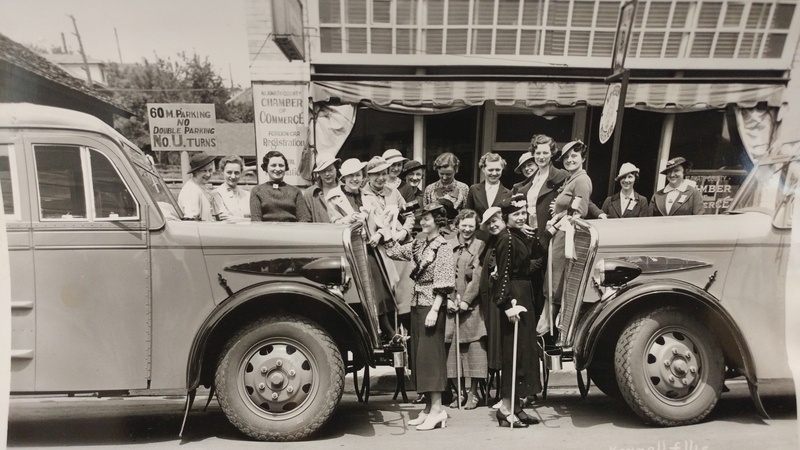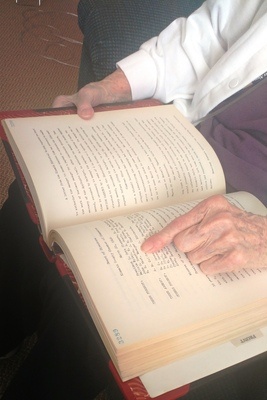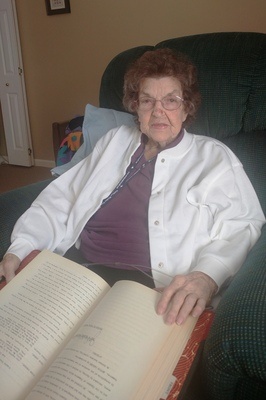
These Hands
By Chamber Editor
Seventy-two years ago, these hands typed the words on these pages. Things were much different then; the country was reeling from the effects of the war and families were torn apart by circumstance. These are the hands of a student, wife, and mother. They are also the hands of a clerk for the Klamath County Chamber of Commerce. These are the hands of Effie Vanderhoff, reunited after so long with the work she performed as a young woman.

The official end to the war was September 2, 1945. By then, Effie Botens had already graduated from Klamath Union High School in June and was hired the very next day by the Chamber. She worked in the offices on Main Street, and was the secretary for Jim Stillwell (today Jim is 97 years old), President of the then Junior Chamber of Commerce, a group of young businessmen who performed the roles our current Ambassadors perform today.
The “big boss” was Charlie Stark, whose name is listed in all of these documents from the era as Manager of the Chamber of Commerce. Effie recalls, “He once told me he could never fire me, because he would never be able to find anything in the filing cabinet.”
Effie worked with three other women in the front office. Esther Lawler, the bookkeeper, and Mary Nelson, who answered main phone lines, are both gone now. Effie’s duties included cutting stencils and mimeographing newsletters, taking meeting minutes using shorthand and then translating into typed records, making reservations, and offering back up assistance to her colleagues. One of her favorite tasks was to help people that came into the office with their questions.
Some things definitely have changed. Effie routinely helped people locate family members displaced by the war, something for which the Chamber does not presently receive many requests. “It was always a good feeling when we could help someone find their people,” she remembers.
Some things have definitely stayed the same. “The most common question we received was, ‘Where’s the falls?’” Effie laughs. The Chamber is still answering that burning question to this day.
Born in a little house (formerly a stage stop) on Keno Highway in 1928, Effie remembers the war era very clearly. “There was a basket, a huge wire thing, outside the courthouse. We were to throw all of our tins and any metal items in there, so they could recycle the metal to make bullets.” Some of the other frugalities imposed by wartime included selling of savings bonds and a new concept called “carpooling”, developed to save rubber and tires.
In the photo below, you can see a happy group of ladies posing in front of two vehicles. Their champagne bottles poised, they are eternally waiting for the signal to christen the two large buses for their inaugural voyage to…somewhere. Effie doesn’t recall where they were going, just that a group of Chamber members’ wives were headed on a trip of some sort. She traces a finger over the photo, exclaiming over their hats.
Effie remembers every single word of the documents she typed way back when, now that she has them in her lap. “Committees were based on your profession,” she says. “So if you were part of the lumber industry, you were on the Lumber Committee. This name here,” she points to a list of names on the Chamber minutes portion of a page, “was Verne Moore, that’s what the V is for. He owned Balsiger’s Cars in the Egyptian building downtown. And this guy was on the Klamath Union School Board with my father; they were the first ones!”
Her finger scrolls down the list, noting those who worked with Pacific Power, farmers, lawyers, and several who worked for ODOT and were responsible for the Lake O’ the Woods road (what we know as Highway 140) being paved; prior to their involvement, the road was gravel.
She stops at a list of names. “These gentlemen were killed in a plane crash,” she reports. The two names she pointed to were men killed near Dorris, CA. “They were board members, and they never showed up. We learned later they were gone.”
Effie is keen to hear information about the cleanup at Northridge Estates, too. “We swam there, you know, in the pool at the barracks. They held functions there. In fact, that’s where I ran into Mr. Vanderhoff (Hubert, such an old fashioned name!) again. I ran around with his brother in school, but when he came back from the war, we were both at an armory dance at the barracks. He was sitting off to the side, and I went over to him and asked if I could sit down. He just said, ‘Go ahead!’ and that’s the start of our great love story!”
Once Effie met Mr. Vanderhoff (Hubert!), their courtship followed the normal progression and soon Effie was married. She no longer worked at the Chamber; she ended her employment there in 1949. “I became a wife, and a year later, a mother, so I didn’t work for the Chamber again until after my daughter was in school. Then, I volunteered once in a while but never worked there as an official employee again,” Effie says. “But it was a great time.”
A great time, though there was a war, and families ripped apart and young men who left home for many years before they could return, if they did. That last sentence may seem odd in response to the events of the era, but to the people that lived it, like Effie Vanderhoff, life was what you made of it. And she made hers pretty great, indeed.

